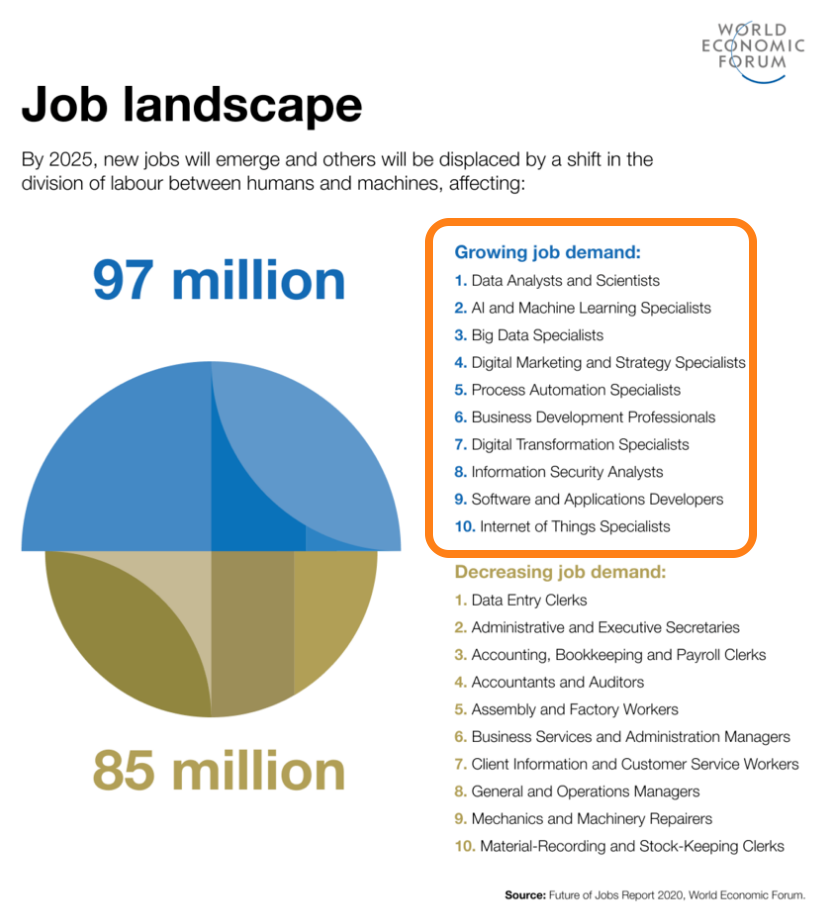Post Views: 1,267
The big data industry is still a relatively new one, yet there is an entire ecosystem of technologies, skills, companies, and jobs that will depend on data sources to grow the economy in a post-pandemic world.
The covid 19 pandemic put a big strain on businesses in all sectors; however, data scientists and data-related skills are in strong demand. The trend to use big data technology to make better decisions during and after the Covid 19 crisis will ultimately determine the survivability of an organization. Whether you just graduated and started looking for a job or are already deep into the job market, the great news is there are many unique opportunities.
According to theWorld Economic Forum, by the year 2025 post-pandemic, nearly 97 million roles will increase in demand. Out of the top 10 in-demand roles, data-related roles are the majority of the need despite the global pandemic. From data analysts, data scientists, artificial intelligence/machine learning, cloud computing, digital transformation, and more due to emerging technology as a result of the crisis. The workforce will be offset by the decreased demand of 85 million jobs that will be dominated by automation, technology, and the need for organizations to capture and utilize data in a post-Covid 19 world.

Table of Contents hide
1 The area of big data is still a good career move
2 Big Data employment prospects
3 Future Big Data employment opportunity breakdown
3.1 1. Big Data Software Development
3.4 Get your data skills ready for the job market
The area of big data is still a good career move
As the business world becomes more dependent on big data, there are increasing opportunities for professionals who can extract insights from the massive amounts of data companies are now collecting. That also rolls into managing the data-related projects and creating the systems that process data.
This pressing need to collect, analyze and secure massive amounts of data has enabled companies to improve their businesses, make better decisions, and ability to increase their competitive advantage.
According toMIT Sloan Review“A2017 report by IBM, for instance, predicted that the number of analytics and data science positions in the U.S. alone would increase by 364,000, to 2,729,000 by 2020. In 2019, LinkedIn ranked “data scientist” theNo. 1 most promising jobin the U.S. based on job openings, salary, and career advancement opportunities and reported a 56% rise in job openings for data scientists over the previous year.”
Big Data employment prospects
According toHP, big data and artificial intelligence will play a big part in the post-pandemic future. The main area will behealthcare. From creating cures to using the data to create new strategies and reduce risk factors. In addition, creating products such as wearables and VR to make healthcare more accessible.
With online purchasing increasing, industries likeretailandCPGs will be looking to add valuable insight into new markets for their products and analyze data to keep current customers. Call center, robotics, and ecommerce data will be in high demand.
Companies that had to facilitate remote work due to social distancing created a surge of organizations that implemented adigital transformationof their infrastructure. This will includecybersecurity for cloud computingenvironments due to the demand for data over the web.
Future Big Data employment opportunity breakdown
1. Big Data Software Development
This includes continued development using Python, Hadoop, Scala, NoSQL, SQL, Spark, Java, R.
Sample position titles:big data engineer, software developer, data engineer
2. Data Mining, Big Data Analytics & Machine Learning
This includes continued learning of SPSS, data modeling, R, Python, MATLAB, Java, Javascript, C, Stata, SQL, SAS, PowerBI, Tableau, Excel.
Example position titles:data scientist, data mining engineer, data analyst, business intelligence, machine learning engineer, business analyst
3. Big Data Operations & Cloud Computing
This includes continued skill development in Linux, serverless architecture, DevOps, storage, networking, virtualization.
Example position titles:cloud computing engineer, cloud architect, data operations
*Note the skills listed are just a few of the many tools used.
Get your data skills ready for the job market
Whether you are a data scientist or data analyst you can increase your chances of having a successful post-pandemic future.
Executives are always looking for actionable insights to make better decisions and data plays a key role.
- Decide how you can contribute by offering valuable insight into industry data. Show how various data sources can be used to create actionable insights for a company.
- Show an employer how you have detected a trend for a company using industry-related data analytics tools.
- For machine learning and artificial intelligence engineers, show your ability to use advanced analytics, augmented analytics, statistics, predictive analytics to assist your organization.
- Be ready to explain how you were able to transition to a remote work environment and remain highly productive.
If you just getting into the job market during the Covid 19 pandemic, please read8 Ways to Get a Job in Data Science with No Experience, and for those with experiencelooking to make a change12 Jobs To Get With A Data Science Degreecould be helpful.